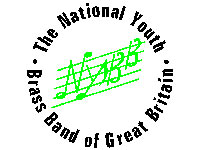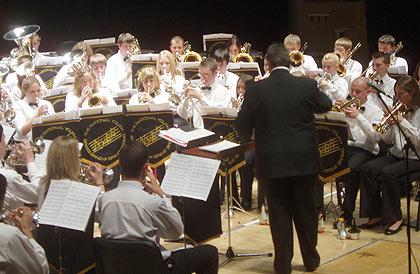National Youth Brass Band of Great Britain
8-Aug-2006Conductor: Dr Robert Childs
Guest Soloist: David Childs
Victoria Hall, Hanley
Saturday 5th August
 Eight original works for Brass Band were on the menu for the 2006 NYBBGB Summer Course to be performed at two concerts; this one in Hanley and the previous evening at the Artrix, Bromsgrove.
Eight original works for Brass Band were on the menu for the 2006 NYBBGB Summer Course to be performed at two concerts; this one in Hanley and the previous evening at the Artrix, Bromsgrove.
The repertoire was a musical feast alright; some starters to wet the taste buds, a number of main courses that would encourage anyone to consider dieting, and if that wasn’t enough, the icing on the cake, came with two fabulous desserts that would make anyone drool – in the form of Guest Soloist, David Childs.
Dr Robert Childs commented that he did wonder in advance of the course whether his protégés would be up to the challenge of the music on offer, but he needn’t have worried. The band came through it all with enormous credit; some tired lips at the end for sure, but a concert that certainly challenged the listener, never mind the players, and that became a thoroughly enjoyable evening.
With over seventy on stage and having performed ‘The National Anthem’, the concert commenced with Peter Graham’s ‘Prelude on Tallis’ featuring the familiar Tallis Canon. The overall sound of the band was bright and secure with the musicians seemingly feeling quite comfortable in an acoustic that could be described as ‘generous’.
A number of the pieces performed during the concert were certainly familiar to the MD (if not the players at the start of the course) having performed them with the BAYV Band. BAYV’s composer-in-residence, Gareth Wood has written a new work for the band entitled ‘A Tear in the Fabric of Time’ and it was first considerable challenge of the night for the players.

White on - Lots of clean shirts as the NYBB tackle Men of Stone
The work relates to the composers ideas on the physics of the Universe that tests the band (not too mention the listener) to its limits in what in effect is a work of symphonic proportions.
Having received its World Premiere the previous evening, the work opens with some effective fanfares that provide the core of the material for the remainder of the piece. Of particular interest is the central section written in the style of a chorale that reflects the darkness of human nature, with the whole work coming to what can only be described as a violent conclusion.
The playing throughout the contemporary work was of a high standard and one that this reviewer would like to hear again in the not to distant future.
To close the first half, the band gave a sensitive reading of one of the classics from the repertoire, Sir Dean Goffin’s ‘Rhapsody in Brass’. Particularly impressive was the second movement (Andante con moto) that featured some fine solo contributions from some of the leading lights within the band, Kate Eggleshaw, Helen Douthwaite, Rebecca Crawshaw and cornet section leader Tom Hutchinson.
Heaton’s idiosyncratic march ‘Le Tricot Rouge’ opened up the second half before the band tackled John Pickard’s ‘Men of Stone’. The piece is a component part of the composer’s ‘Gaia Symphony’ and the conductor informed the audience that the band will perform the work in full (although he didn’t say when) but it wouldn’t be a surprise if all the individual sections were performed separately before tackling the sixty-two minute work in its entirety.
‘Men of Stone’ is the final part of the symphony and represents earth. This was an excellent performance that contains four movements (played continuously) each reflecting a particular time of day at a certain time of the year. Having performed the work previously with BAYV, Dr Childs knows the work backwards and deserves enormous credit for bringing the best out of the band. There was fine dynamics, tight ensemble playing, let alone excellent expressive solo work (one example being David Moore on flugel) which enhanced the overall quality of the performance.
The concert in Bromsgrove and this one were a special occasion for the conductor. In addition to being a previous member, tutor and council member of the NYBBGB, Dr Childs had the opportunity to conduct the band with his son as guest soloist.
David Childs of course needs no introduction and his father spoke with affection and enormous respect for his son’s command of his instrument. In the first half, David gave a commanding performance of the Horovitz ‘Euphonium Concerto’ where the middle movement (lento) was a joy to behold.
Not content with the Horovitz concerto, David gave a masterclass with a stunning performance of a newish work written by Philip Sparke. Entitled ‘Harlequin’, the work takes its inspiration from the sad and happy masks of the Commedia dell’Arte, which has the Harlequin as one of the characters.
If David’s playing of ‘Harlequin’ had been the final contribution of the night, no-one would really have objected, but the official closing item was Downie’s ‘The Promised Land’ – written for BAYV and used as its Own Choice selection at the Europeans in Belfast earlier in the year.
Once again, the band gave an accomplished performance of a work that features the familiar welsh tunes Cwm Rhondda and Myfanwy. With stamina still in the tank, the band seemed to enjoy this work enormously (perhaps more than any other on the night). Special mention must go to euphonium, Ryan Day, who coped with the solo lines written for David Childs and Ben Gernon who nailed the bass cadenza towards the end of the work with consummate ease.
As an encore, Dr Childs’ band performed ‘Sosban Fach’ – a traditional Welsh tune with some very strange lyrics it seems that has a tendency to be sung with gusto by thousands of rugby enthusiasts within the Principality before rugby internationals at the Millennium Stadium.
The NYBBGB contains a number of players who already play with championship section bands. Others within the band are also destined to be performing at the highest level in the not to distant future. The NYBBGB continues to maintain its exceptionally high standards set by its predecessors and the evidence of this concert gave a real sense of optimism for the future of the movement.
Malcolm Wood









